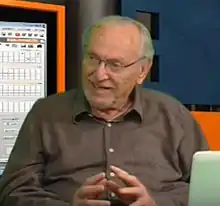Menachem Cohen (scholar)
Menachem Cohen (born c. 1928) is an Israeli scholar who worked for over 30 years to correct grammatical errors in the Hebrew Bible. The last attempt at this was in 1525, by Jacob Ben-Hayim. Cohen's work demonstrates the extent to which Judaism venerates every tiny biblical calligraphic notation, to ensure that worldwide communities use exactly the same version of the Old Testament.[1][2][3][4][5][6]
Menachem Cohen | |
|---|---|
 | |
| Born | 1928 (age 92–93) |
| Nationality | Israeli |
| Occupation | Scholar |
| Employer | Bar-Ilan University |
| Known for | Correcting approximately 1500 Biblical errors relating to grammar and accentuation |
Background
According to Jewish law, a Torah is invalid for public reading[7] if even a single letter is incorrect or misplaced,[8] for Jewish law considers each letter as indispensable.[9]
In 1525, in Venice,[10] Jacob Ben-Hayim, editor of the second edition of the Mikraot Gedolot, took it upon himself to fix grammatical errors in the Hebrew Bible. Ben-Hayim's version unified Judaism's varying texts and commentaries on the Bible under one umbrella, and it is this version that has remained the standard version used by generations to this day. However, Ben-Hayim had to rely on inferior manuscripts and commentaries, which caused numerous inaccuracies to appear in his version, and these were only magnified in subsequent editions.[1]
Mission
In 2012, 84-year-old Israeli Judaic scholar Menachem Cohen of the Bible department at Bar-Ilan University finished a 30-year mission to fix all known textual errors in the Hebrew Bible to produce a "truly definitive edition of the Old Testament."[1][11]
Cohen's edits focused mainly on grammatical errors, such as fixing the accent of a vowel, the letter in a word, or fixing biblical symbols used for accentuation and cantillation (te'amim[12]) which were copied down incorrectly centuries ago. Cohen used thousands of medieval manuscripts to identify approximately 1,500 inaccuracies in the Hebrew Bible, which he corrected in a 21-volume set. The errors that Cohen found do not alter the meaning of the Bible or have any bearing on its stories. Most errors were not found in the Torah (or Five Books of Moses), which does not include vowel markings or cantillation notations,[13] but rather in the final two-thirds of the Tanakh. Cohen also included the most comprehensive commentaries available, most notably that of Rashi.[1]
Cohen primarily relied on the Aleppo Codex, a thousand-year-old text considered to be the most accurate copy of the Bible.[14] In 1947, a Syrian mob burned the synagogue that was protecting the Codex,[15] and the Codex briefly disappeared before most of it was smuggled out into Israel a decade later.[1]
Cohen has not called for any changes in how traditional Torah scrolls are written, as this would likely result in a "firestorm of objection and criticism," but rather aimed for accuracy in versions used by Hebrew readers for studying.[1]
Cohen said:
The people of Israel took upon themselves, at least in theory, one version of the Bible, down to its last letter...
It was amazing to me that for 500 years, people didn't sense the errors.They just assumed that everything was fine, but in practice everything was not fine...
I want the Bible to be user-friendly. Today, we can create sources of information and searches that allow you to get an answer to everything you are wondering...[1]
Cohen also stressed that unity and accuracy in the Hebrew Bible were important in order to distinguish the sacred Jewish text from those used by break-away sects, such as the Christians and Samaritans.[1]
In addition, Cohen launched a digital version, with the help of his son Shmuel, a computer programmer, which he hopes will become a benchmark of the Israeli education system.[1]
References
- Heller, Aron (August 11, 2012). "Menachem Cohen, Israeli Scholar, Completes Mission To 'Fix' Hebrew Bible". The Huffington Post. Retrieved August 11, 2012.
- Heller, Aron (August 8, 2012). "Israeli scholar completes mission to 'fix' Bible". USA Today. Associated Press. Retrieved August 11, 2012.
- Heller, Aron (August 8, 2012). "Israeli scholar completes mission to 'fix' Bible". Yahoo News. Associated Press. Retrieved August 11, 2012.
- "Israeli scholar completes mission to 'fix' Bible". CBS News. Associated Press. August 8, 2012. Retrieved August 11, 2012.
- "Israeli 'fixes' Bible inconsistencies". Saudi Gazette. Archived from the original on October 7, 2015. Retrieved August 11, 2012.
- Enzinna, Peter (August 9, 2012). "Israeli scholar offers 'correct' Hebrew Bible". NY Daily News. Retrieved August 11, 2012.
- Elkins, Rabbi Dov Peretz (2010). Sidrah Sparks: Talking Torah at the Table With Your Family. Authorhouse. p. 98. ISBN 978-1449092016.
- Finkel, Avraham (2002). Kabbalah: Selections From Classic Kabbalistic Works From Raziel Hamalach To The Present Day. Targum Press. p. 85. ISBN 1568712189.
- Munk, Michael (1983). The Wisdom in the Hebrew Alphabet: The Sacred Letters As a Guide to Jewish Deed and Thought. Mesorah Publications. p. 30. ISBN 0899061931.
- Eber, Irene (1999). The Jewish Bishop and the Chinese Bible: S.I.J. Schereschewsky (1831-1906). BRILL. p. 182. ISBN 9004112669.
- Hasson, Nill (18 July 2012). "Reconstructing the Bible". Haaretz. Retrieved 12 September 2012.
- Saebo, Magne (2009). Hebrew Bible / Old Testament: The History of Its Interpretation: from the Renaissance to the Enlightenment. Vandenhoeck & Ruprecht, 2008. p. 289. ISBN 978-3525539828.
- Robinson, George (2006). Essential Torah: A Complete Guide to the Five Books of Moses. Random House Digital, Inc. ISBN 0805241868.
- Berlin, Adele; Brettler, Marc Zvi; Fishbane, Michael (2004). The Jewish Study Bible: featuring The Jewish Publication Society TANAKH Translation. Oxford University Press. pp. 2081. ISBN 0195297512.
- Tawil, Hayim & Schneider, Bernard (2010). Crown of Aleppo: the mystery of the oldest Hebrew Bible codex. Jewish Publication Society. p. 10. ISBN 978-0827608955.
External links
- Mikra`ot Gedolot - `Haketer` (Published books of the Bible incorporating Cohen's corrections.)
